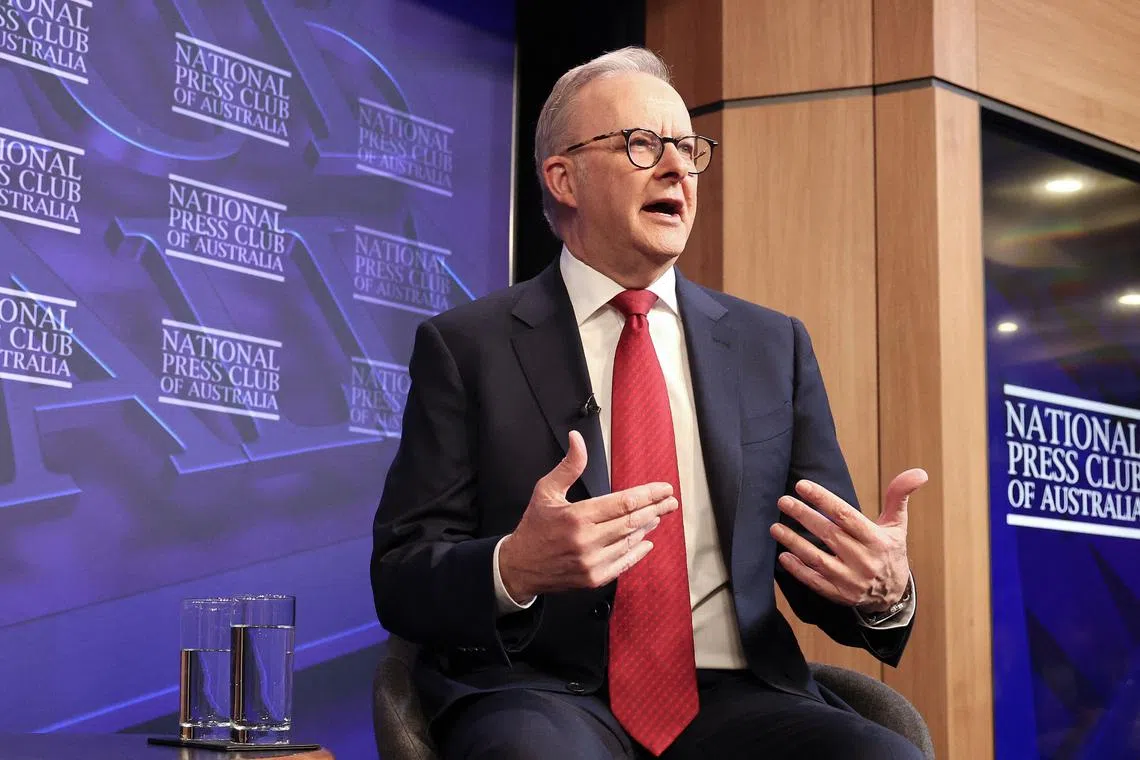‘Trump’s the reason’: Aussies’ appetite for change at May 3 polls dampened by global instability
Sign up now: Get insights on Asia's fast-moving developments

Australia's Prime Minister Anthony Albanese speaking at the National Press Club in Canberra on April 30.
PHOTO: AFP
SYDNEY - Mr Anthony Albanese is on track to become the first Australian prime minister to be re-elected in more than 20 years, as global uncertainties and US President Donald Trump’s chaotic leadership
Despite voter anger over the rising cost of living, opinion polls indicate that Prime Minister Albanese’s Labor Party is set to defeat the Liberal-National Coalition in the May 3 election, though it may not gain a parliamentary majority.
Labor leads the Coalition by 52.6 per cent to 47.4 per cent, according to polling averages compiled by The Poll Bludger website. A survey released on May 1 by YouGov found Labor will win 84 seats and a clear majority in the 150-seat House of Representatives, with 47 seats for the Coalition, 14 for independents, three for the Greens and two for other minor parties.
However, no party is expected to gain a majority in the state-based Senate.
As in Canada, where the ruling Liberal Party staged a spectacular political comeback and defeated the Conservative Party in its April 28 general election, Mr Trump has been credited with helping Labor’s revival in Australia.
Mr Kos Samaras, director of strategy and analytics at polling firm RedBridge, told The Straits Times that Mr Trump’s tariffs and unpopularity in Australia will be the “No. 1” issue affecting people’s votes at the coming election.
He said voters have been turned off by Coalition leader Peter Dutton because he had adopted Trump-like policies such as cutting the public service and opposing work from home for civil servants – policies that he later abandoned.
“Trump is the No. 1 reason as to what is shaping voters’ decisions in our polling. They view Trump as a destructive force that will impact them,” said Mr Samaras.
“Unfortunately for the Coalition, Dutton had an association with Trump as a brand. The minute he went into that space, it basically sealed the deal.”
Despite Australia being one of the US’ closest allies and one of a few countries to have a trade deficit with the superpower, Mr Trump stunned the nation by refusing to exempt Australia from his tariffs.
Unlike Canadian Prime Minister Mark Carney, who faced threats from the White House to annex Canada, Mr Albanese has not directly confronted Mr Trump.
But the Australian leader stood firm in his condemnation of the tariffs. In the eyes of some voters, the stand-off showed that Mr Albanese – who is often dismissed as weak, particularly in contrast to Mr Dutton, a hardliner and former defence minister – was capable of assertive leadership.
Ms Angela Ryan, 59, a voter in the Labor-held seat of Canberra, told ST she typically voted for Labor and intended to stick with the party at this election. She said Mr Trump’s policies had made her more convinced that she should support Mr Albanese.
“Trump made me more resolved to steer clear of the Liberal Party,” said Ms Ryan, who works in vocational education. “Albanese demonstrated strength and was quite explicit on the tariffs – he was better than I thought he would be.”
Mr Trump’s unpredictable presidency has also added to a sense of growing global instability and heightened anxieties in Australia that have been credited with prompting voters to opt for the status quo.
A Resolve poll published on April 28 found 30 per cent of voters said their views of Mr Trump made them less likely to vote for the Coalition, while just 15 per cent said it made them more likely, and 55 per cent were undecided.
Australian politics professor Rodney Smith of the University of Sydney told ST that Mr Trump had helped Labor to “play the stability card in troubled times”.
“(Trump) has definitely had an impact on the campaign and made Peter Dutton more cautious about presenting himself as a Trump-like leader,” he said.
Prof Smith said Mr Trump may also be prompting a rise in support for One Nation, the party of anti-migrant firebrand Pauline Hanson, which may be receiving support from voters seeking a populist nationalist alternative to the major parties. Polls indicate One Nation will receive 8 per cent of the vote, up from 5 per cent at the last election in 2022.
In recent years, Australia has been described as the “coup capital of the world” due to a series of prime ministers being ousted by their parties, including Labor’s Kevin Rudd and Julia Gillard and the Liberals’ Tony Abbott and Malcolm Turnbull. No Australian prime minister has won consecutive elections since 2004, when Mr John Howard won a fourth successive election.
Despite his lead in the polls, Mr Albanese, a veteran MP and former party official who entered Parliament in 1996, does not enjoy widespread popularity. He led Labor to victory at the May 2022 election, as inflation was soaring and interest rates were beginning to surge. His approval ratings plunged after he oversaw a failed referendum to promote Indigenous rights in October 2023 – a move that led to concerns that he was failing to focus on the rising cost of living.
But Labor’s fortunes have improved due to a steady drop in inflation – from a recent high of 7.8 per cent in December 2022 to the current rate of 2.4 per cent – and a decision by the central bank to cut interest rates in February 2025, ending a long run of rate rises.
The latest Newspoll survey found 43 per cent of voters were satisfied with Mr Albanese’s performance, compared with 52 per cent dissatisfied and 5 per cent uncommitted.
But Mr Albanese has benefited from the unpopularity of Mr Dutton, a former police officer known for his tough approach to immigration and crime. Just 35 per cent of voters were satisfied with the opposition leader, compared with 59 per cent dissatisfied and 6 per cent uncommitted.
Despite the growing anxieties about global stability, Mr Albanese and Mr Dutton have largely focused their campaigns on local issues. Mr Albanese is promising a tax cut of A$5 (S$4) a week from 2026, while Mr Dutton proposes to cut petrol taxes by 25 Australian cents a litre for a year.
In response to concerns about housing unaffordability, Mr Albanese promised to spend A$10 billion on building 100,000 homes for first-home buyers and Mr Dutton vowed to let first-home buyers claim tax deductions for mortgage payments on newly built homes.
The most ambitious plan was Mr Dutton’s controversial A$331 billion proposal to build seven government-owned nuclear reactors, but the move has received relatively little attention, partly because Mr Dutton has not campaigned strongly for it.
Another feature of the polls is likely to be the continuing trend of voters turning away from Labor and the Coalition in favour of independents and minor parties. At the 2022 election, the vote for the major parties fell to a record low, with 31.5 per cent of voters backing independents and minor parties.
A voter in the Sydney electorate of Wentworth, Tara, a 39-year-old who did not want to give her surname because she preferred to keep her voting intention private, told ST she supported the Greens due to the party’s strong stance on addressing climate change. The mother of two works in schools administration and said she viewed Labor and the Coalition as “quite similar”.
“The major parties like to battle it out, but both are not doing anything major for the country,” she said. “Hopefully, the Greens will do something for the environment.”
Still, Mr Dutton will be hopeful that cost-of-living concerns are strong enough to encourage voters to back a change.
And, as always, the vote in many electorates will depend on the popularity of local candidates.
Some candidates familiar to the growing Asian-Australian electorate include Ms Hannah Thomas, the daughter of former Malaysian attorney-general Tommy Thomas.
The Greens candidate is contesting in the Sydney seat of Grayndler against Mr Albanese, who is popular locally and expected to easily retain his seat.
In the Western Australian seat of Tangney, Liberal candidate Howard Ong, brother of Singapore’s Health Minister Ong Ye Kung, is facing off against Malaysian-born Labor MP Sam Lim, who holds the seat by a margin of less than 3 per cent.
Elsewhere, Ms Hanson’s daughter, Ms Lee Hanson, is vying for a seat in the Senate as a candidate for her mother’s One Nation party. No party is expected to gain a majority in the state-based Senate.
So, while polls indicate Mr Albanese’s Labor is on track to win and is the only side that can win a majority in the House of Representatives, he would still need to do deals with the opposition, Greens and other MPs to pass Bills through the Senate.
And he – or Mr Dutton – will still face the prospect of trying to secure a deal with Mr Trump.



